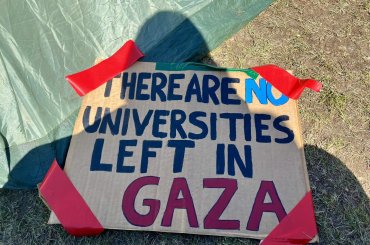Most people imagine that voting rights and citizenship hold a protected status in Western democracies. Yet today’s reality reveals how flimsy those protections are, with the coronavirus pandemic further revealing the ugly face of institutional racism.
The many assaults perpetrated by racist social systems against the human dignity of people of color should be fertile ground for communal outrage and a demand for systemic change. In fact, as a Palestinian from Israel currently living in the United States, it is startling to realize the many commonalities between our two systems of oppression: limited access to health care for marginalized communities, the stereotyping of people of color as disease-spreaders, and the increased impact of the COVID-19 pandemic on these populations.
When the Israeli Prime Minister, Benjamin Netanyahu, accused the Palestinian population in Israel of being the least likely to abide by social distancing orders he was scapegoating Palestinian citizens as spreaders of the disease to Jewish Israeli citizens. No wonder similar messages inciting prejudice towards immigrants and minorities have been uttered by the President of the United States, Donald Trump, in his repeated reference to COVID-19 as “the Chinese virus.”
Discussions about the disparate impact of COVID-19 on Palestinian communities in Israel and Latinx and African American communities in the U.S. is growing. For example, there is growing evidence of a heightened infection and mortality rate among Black people living in low-income communities. Even though Arabs in Israel are represented relatively well among health professions, they are not represented in the Israeli Ministry of Health’s contingency planning committee (as Haaretz reports). In 2017, Arabs filled 12.4% of government health jobs, and made up 42% of nursing students, 38% of pharmaceutical professionals, and 17% of MDs in Israel. In fact, health care in Israel has been described as a “model of genuine commonality between Arabs and Jews”. Yet, there is not a single governmental hospital in any of Israel’s Arab cities or towns. Additionally, the Arab communities residing in Israel have relatively very little access to COVID-19 test kits orany reliable information about the spread of the virus. A governmental plan to build drive-in testing stations provided resources for seven Jewish cities but not one Arab community. Only one clinic in an Arab city has been designated as a primary corona clinic, compared to the 45 in Jewish cities. Furthermore, public information about the pandemic has almost entirely been disseminated in Hebrew. Arab Knesset members are scrambling to advocate for the development of health information in Arabic and increased testing in Arab communities as well as developing an economic support plan. So much for a model of equality.
Similar inequalities are observed across the US. These issues exist in a shared context of systemic inequality whereby the same populations are being most neglected with respect to the current pandemic are also those who live in poverty, are part of the working class, and are disproportionately affected by pre-existing health conditions that increase vulnerability to the effects of COVID-19.
Ultimately, the increased impact of coronavirus on Arab communities in Israel and the Latinx and African American communities in the US will be overlooked by formal institutions all while members of these communities are most in need of support. This neglect is more stark for Palestinians in the West Bank and Gaza who continue to suffer under an illegal military occupation, blockade, and denial of human rights. This is a lesson in the real limitations of citizenship, but it is probably not on the minds of most of those outside of these communities. People of color know how these systems work first hand, because they are the most impacted by the failures and inequities of those systems.
This reality is also the largest contributor to additional grief, anxiety and bitterness that I am experiencing – I hope alongside many others of all different backgrounds who believe in human dignity. Government health agencies should work to live up to the core ideals of helping professions.


